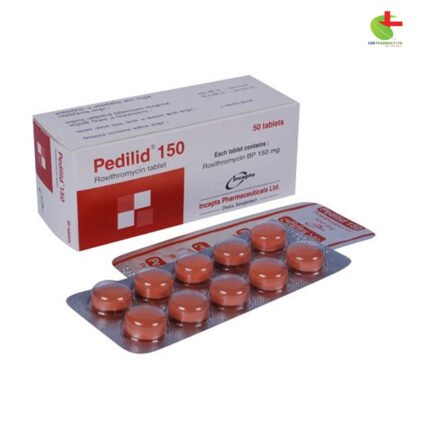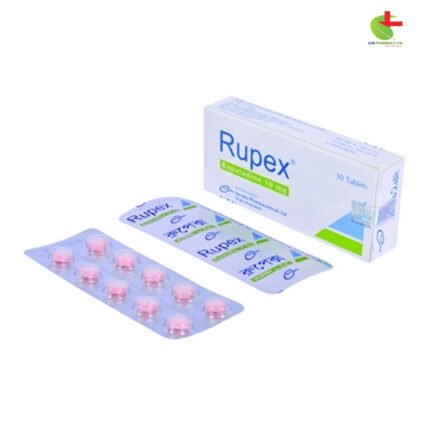Pedilid 300
140.00৳ Strip
- Pedilid is a macrolide antibiotic used to treat bacterial infections.
- Effective against respiratory, ENT, skin, and genital infections caused by Gram-positive, Gram-negative, and atypical bacteria.
- Inhibits bacterial protein synthesis by binding to the 50S ribosomal subunits.
- Suitable for both adults and children, with a well-tolerated safety profile.
- Always follow a healthcare provider’s guidance for proper dosage and usage.
 Brand
Brand
|
Incepta Pharmaceuticals Ltd |
|---|---|
 Generics
Generics
|
Roxithromycin |
 Type
Type
|
Tablet |
Indications
Pedilid is indicated for the treatment of infections caused by susceptible microorganisms, including:
- Respiratory infections: Pneumonia, acute and chronic bronchitis, and bronchopneumonia.
- ENT infections: Tonsillitis, pharyngitis, sinusitis, and otitis media.
- Skin infections: Folliculitis, furuncles, cellulitis, carbuncles, pyoderma, impetigo, and infected dermatitis.
- Genital infections: Urethritis, prostatitis, cervicitis, and salpingitis, particularly those caused by Chlamydia trachomatis.
Consult a registered healthcare provider before use.
Description
Pedilid is a macrolide antibiotic, closely related to erythromycin, with broad-spectrum antibacterial activity. It is effective against Gram-positive bacteria (e.g., staphylococci, streptococci, listeria) and Gram-negative bacteria (e.g., gonococci, Haemophilus influenzae, Legionella, Campylobacter), as well as atypical pathogens such as Mycoplasma and Chlamydia. Pedilid is commonly prescribed for a range of infections, including respiratory, ENT, skin, dental, and genital infections. It is well tolerated by both adults and children.
Pharmacology
Roxithromycin, the active ingredient in Pedilid, inhibits bacterial protein synthesis by binding irreversibly to the 50S ribosomal subunit, blocking critical cellular processes like transpeptidation and translocation. This leads to stunted bacterial growth and prevents the spread of infection.
Dosage & Administration
For Adults:
- Standard dose: 300 mg once daily or 150 mg twice daily for at least two days after symptom resolution. The typical course of therapy lasts between 5 to 10 days.
- Pedilid is best taken on an empty stomach. In cases of severe hepatic impairment, the dose should be reduced to 150 mg once daily.
For Pediatric Patients (ages 6 months to 12 years):
- The typical dose is 2.5 to 5 mg/kg body weight, administered twice a day.
- Recommended doses by weight:
- 6-11 kg: 25 mg twice daily.
- 12-23 kg: 50 mg twice daily.
- 24-40 kg: 100 mg twice daily.
- Treatment duration is generally 5 to 10 days.
Consult a registered healthcare provider before use.
Interactions
Pedilid does not interact significantly with cytochrome P-450 enzymes, making it less likely to cause drug interactions via this pathway. Mild interaction with theophylline has been observed, but it does not lead to clinically significant effects. There is no known effect on the pharmacokinetics of carbamazepine or warfarin. Additionally, antacids, H2-receptor antagonists, and food do not impact Pedilid absorption.
Contraindications
- Pedilid should not be used with ergotamine or its derivatives, as this combination can cause arterial spasm and severe ischemia.
Side Effects
Pedilid is generally well tolerated. Common side effects, which occur in less than 4% of patients, include:
- Nausea
- Abdominal pain
- Diarrhea
- Hypersensitivity rash
Other reported side effects include vomiting, dizziness, headache, pruritus, dyspepsia, flatulence, tinnitus, vertigo, and constipation. These side effects are typically mild and do not require discontinuation of therapy.
Pregnancy & Lactation
The safety of Roxithromycin during pregnancy has not been established. Small amounts of the drug may be excreted in breast milk, but no adverse effects on breastfeeding infants have been reported.
Precautions & Warnings
- Pedilid should be avoided in patients with a history of hypersensitivity to this drug or other macrolide antibiotics.
- In patients with liver disease, the maximum recommended dose should be 150 mg twice a day.
Therapeutic Class
Macrolides













Reviews
There are no reviews yet.